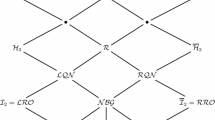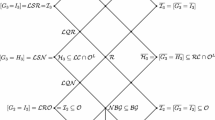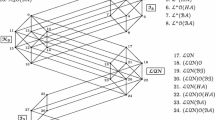Abstract
We show that for each \(n\ge 2\in {\mathbb {N}}\), the varieties \({\mathbb {V}}_{n}=[x_1x_2x_3=x_1^nx_{i_1}x_{i_2}x_{i_3}]\) where i is any non-trivial permutation of \(\{1,2,3\}\) are closed. Further, we show that for each \(n\in {\mathbb {N}}\), the varieties \({\mathcal {V}}_{n}=[x_1x_2x_3=x_1^nx_{i_1}x_{i_2}x_{i_3}]\) where i is any non-trivial permutation of \(\{1,2,3\}\) other than the permutation (231) are closed.
Similar content being viewed by others
1 Introduction and preliminaries
Let U be a subsemigroup of a semigroup S. Following Isbell [10], we say that U dominates an element d of S, if for every semigroup T and all morphisms \(\beta ,\gamma :S\rightarrow T\), \(u\beta =u\gamma \), for all \(u\in U\) implies that \(\mathrm{d}\beta =\mathrm{d}\gamma \). The set of all elements of S dominated by U is called the dominion of U in S and we denote it by Dom(U, S). It can be easily verified that Dom(U, S) is a subsemigroup of S containing U. A subsemigroup U of a semigroup S is said to be closed in S if \(Dom(U,S)=U\) and it is said to be absolutely closed if it is closed in every containing semigroup S.
A class \({\mathcal {V}}\) of semigroups is a variety of semigroups if it is closed under subsemigroups, morphic images and arbitrary direct products. Also it is well known that each variety of semigroups is an equational class and vice versa Howie [9]. Therefore \({\mathcal {V}}\) is a variety if and only if each member of \({\mathcal {V}}\) satisfies certain finite or infinite identities of fixed type. If the variety \({\mathcal {V}}\) of semigroups satisfies identities \(u_i=v_i\) (\(i\ge 1\)), then we write it as \({\mathcal {V}}=[u_i=v_i:i\ge 1]\). For example some well known varieties of semigroups are the variety \({\mathcal {V}}_1=[xy=yx]\) of all commutative semigroups, the variety \({\mathcal {V}}_2=[x^2=x]\) of all bands and the variety \({\mathcal {V}}_3=[x_1x_2\ldots x_n=x_{i_1}x_{i_2}\ldots x_{i_n}]\) of all permutative semigroups, where i is a non-trivial permutation on \(\{1,2,\ldots , n\}\). Let \(u(x_1, x_2,\ldots , x_n)=v(x_1, x_2,\ldots ,x_n)\) be an identity with variables \(x_1, x_2,\ldots , x_n\). Then the identity \(u(x_1, x_2,\ldots , x_n)=v(x_1, x_2,\ldots ,x_n)\) is called homotypical if \(c(u)=c(v)\), where c(w), for any word w, is the set of variables appearing in w. A semigroup variety admitting a homotypical identity is called a homotypical variety and heterotypical otherwise.
We say that a variety \({\mathcal {V}}\) is closed if for all \(U,S\in {\mathcal {V}}\) with U as a subsemigroup of S, \(Dom(U, S)=U\). Let \({\mathcal {V}}_1\) and \({\mathcal {V}}_2\) be two varieties of semigroups such that \({\mathcal {V}}_1\) is a subvariety of \({\mathcal {V}}_2\). Then we say that \({\mathcal {V}}_1\) is \({\mathcal {V}}_2\)-closed if for every \(U\in {\mathcal {V}}_1\) and \(S\in {\mathcal {V}}_2\) with U as subsemigroup of S, \(Dom(U, S)=U\).
Isbell [10], provided the most useful characterization of semigroup dominions which is called as Isbell’s Zigzag Theorem and is as follows:
Theorem 1.1
([9] Theorem 8.3.5) Let U be a subsemigroup of a semigroup S and \(d\in S\). Then \(d\in \text {Dom}(U,S)\) if and only if \(d\in U\) or there exists a system of equalities for d as follows.
where \(a_i\in U~(0\le i\le 2m)\) and \(x_i,y_i\in S~(1\le i\le m)\).
The above system of equalities (1.1) is called as the zigzag of length m in S over U with value d. In whatever follows, by zigzag equations, we shall mean equations of the type (1.1). We further mention that the bracketed statements shall mean the statements dual to other.
2 Homotypical closed varieties of semigroups
Scheiblich [11], had shown that the variety of normal bands was closed. However, the variety of normal bands was not absolutely closed as Higgins [7] had shown that the variety of left [right] normal bands was not absolutely closed. Howie [8] had shown that the variety of rectangular bands was not absolutely closed. Therefore finding closed varieties of bands remains an open problem for quite long. Recently this problem gained attention as Alam and Khan [6], Ahanger and Shah [2], and Ahanger et al. [3], have extended the above results. However, the problem of finding closed varieties of bands has not been completely settled. Since any band variety is a homotypical variety, so it becomes interesting to find closed homotypical varieties of semigroups. In this paper we find some closed homotypical varieties of semigroups.
In [1], Shabnam et al. have shown that the variety of semigroups satisfying the identity \(x_1x_2x_3=x_1x_1x_3x_2\) is closed. In the next proposition, we show that for each \(n\in {\mathbb {N}}\), the variety of semigroups satisfying an identity of the type \(x_1x_2x_3=x_1^nx_1x_3x_2\) is closed and have generalized the above result.
Lemma 2.1
For each \(n\in {\mathbb {N}}\), let \({\mathcal {V}}_{n}=[x_1x_2x_3=x_1^nx_1x_3x_2]\) and let \(S\in {\mathcal {V}}_{n}\). Then S also satisfies the identity \(xyz=xy^{n+1}z\).
Proof
For any \(x,y,z\in S\), we have
\(\square \)
Proposition 2.2
For each \(n\in {\mathbb {N}}\), the variety \({\mathcal {V}}_{n}=[x_1x_2x_3=x_1^nx_1x_3x_2]\) of semigroups is closed.
Proof
Let S, U be in \({\mathcal {V}}_{n}\) such that U is a subsemigroup of S. Take any \(d\in Dom(U, S)\setminus U\) and let (1.1) be zigzag equations in S over U with value d of length m.
To prove the proposition we first prove the following lemma.
Lemma 2.3
For all \(k=1,2,\ldots , m-1\),
Proof
We prove the lemma by applying induction on k. For \(k=1\), we have
Hence the result holds for \(k=1\). Assume inductively that the result holds for \(k=l<m-1\). We prove that the result also holds for \(k=l+1\). Now
as required. \(\square \)
Now to complete the proof of proposition, we have
Thus \(d\in U\) as required. \(\square \)
In the next proposition, we show that for each \(n\in {\mathbb {N}}\), the variety of semigroups satisfying an identity of the type \(x_1x_2x_3=x_1^nx_3x_2x_1\) is closed.
Lemma 2.4
For each \(n\in {\mathbb {N}}\), let \({\mathcal {V}}_{n}=[x_1x_2x_3=x_1^nx_3x_2x_1]\) and \(S \in {\mathcal {V}}_{n}\). Then S also satisfies the identity \(xyz=xyzy^{n}\).
Proof
For any \(x,y,z\in S\), we have
\(\square \)
Proposition 2.5
For each \(n\in {\mathbb {N}}\), the variety \({\mathcal {V}}_{n}=[x_1x_2x_3=x_1^nx_3x_2x_1]\) of semigroups is closed.
Proof
Let S, U be in \({\mathcal {V}}_{n}\) such that U is a subsemigroup of S. Take any \(d\in Dom(U, S)\setminus U\) and let (1.1) be zigzag equations in S over U with value d of length m.
To prove the proposition we first prove the following lemma.
Lemma 2.6
For all \(k=1, 2,\ldots , m-1\),
Proof
We prove the lemma by applying induction on k. For \(k=1\), we have
Hence the result holds for \(k=1\). Assume inductively that the result holds for \(k=l<m-1\). We will show that the result also holds for \(k=l+1\). Now
as required. \(\square \)
Now to complete the proof of proposition, we have
which is in U as required. \(\square \)
In [5], Alam and Khan have shown that the variety of semigroups satisfying an identity \(x_1x_2x_3=x_1x_2x_1x_3\) is closed. In the next proposition, we extend this result by proving that for each \(n\in {\mathbb {N}}\), the variety of semigroups determined by identities of the type \(x_1x_2x_3=x_1^nx_2x_1x_3\) is closed.
Proposition 2.7
For each \(n\in {\mathbb {N}}\), the variety \({\mathcal {V}}_{n}=[x_1x_2x_3=x_1^nx_2x_1x_3]\) of semigroups is closed.
Proof
let S, U be in \({\mathcal {V}}_{n}\) such that U is a subsemigroup of S. Take any \(d\in Dom(U, S)\setminus U\) and let (1.1) be zigzag equations in S over U with value d of length m.
To prove the proposition, we first prove the following lemma.
Lemma 2.8
For all \(k=1,2,\ldots , m\), \(d=(\prod _{i=1}^kx_i^{n}a_{2i-1}^{n})d\).
Proof
We prove the result by applying induction on k. For \(k=1\),
as required. Assume that the result holds for \(k=l<m\). We will show the result also holds for \(k=l+1\). Now
as required. \(\square \)
Now to complete the proof of proposition, we have
Thus \(d\in U\) as required. \(\square \)
In the next proposition, we show that the variety of semigroups satisfying an identity of the type \(x_1x_2x_3=x_1^nx_3x_1x_2\) \(\forall n \in {\mathbb {N}})\) is closed.
Lemma 2.9
For each \(n\in {\mathbb {N}}\), let \({\mathcal {V}}_{n}=[x_1x_2x_3=x_1^nx_3x_1x_2]\) and \(S\in {\mathcal {V}}_{n}\). Then S also satisfies the identity \(xyz=xyzy^{2n}\).
Proof
For any \(x,y,z\in S\), we have
\(\square \)
Proposition 2.10
For each \(n\in {\mathbb {N}}\), the variety \({\mathcal {V}}_{n}=[x_1x_2x_3=x_1^nx_3x_1x_2]\) of semigroups is closed.
Proof
Let S, U be in \({\mathcal {V}}_{n}\) such that U is a subsemigroup of S. Take any \(d\in Dom(U, S)\setminus U\) and let (1.1) be zigzag equations in S over U with value d of length m.
To prove the proposition we first prove the following lemma.
Lemma 2.11
For all \(k=1,2,\ldots , m\), \(d=d(\prod _{i=1}^k a_{2k-(2i-1)}^{2n})\).
Proof
We prove the lemma by applying induction on k. For \(k=1\), we have
Therefore, the result holds for \(k=1\). Assume inductively that the result holds for \(k=l<m\). We will show that the result also holds for \(k=l+1\). Now
as required. \(\square \)
Now to complete the proof of proposition, we have
which is in U as required. \(\square \)
In [4], Alam and Khan have shown that the variety of semigroups satisfying the identity \(xy=xyx\) \([yx=xyx]\) is closed. Next we generalize this result by showing that for each \(n\ge 2\in {\mathbb {N}}\), the variety of semigroups satisfying the identity \(x_1x_2x_3=x_1^nx_2x_3x_1\) is closed.
Lemma 2.12
For each \(n\ge 2 \in {\mathbb {N}}\), let \({\mathbb {V}}_{n}=[x_1x_2x_3=x_1^nx_2x_3x_1]\) be a variety of semigroups and S be any member of \({\mathbb {V}}_{n}\). Then S satisfies the identity \(xyz=x^{2n-1}y^{2n-2}xyzxy^2\).
Proof
For any \(x,y,z\in S\), we have
\(\square \)
Proposition 2.13
For each \(n\ge 2\) in \({\mathbb {N}}\), the variety \({\mathbb {V}}_{n}=[x_1x_2x_3=x_1^nx_2x_3x_1]\) is closed.
Proof
Let S, U be in \({\mathbb {V}}_{n}\) such that U is a subsemigroup of S. Take any \(d\in Dom(U, S)\setminus U\) and let (1.1) be zigzag equations in S over U with value d of length m.
To prove the proposition we first need to prove the following lemma.
Lemma 2.14
For all \(k=1,2,\ldots , m\),
Proof
We prove the lemma by applying induction on k. For \(k=1\),
Assume that the result holds for \(k=l<m\). We show that the result also holds for \(k=l+1\).
as required. \(\square \)
Now to complete the proof of proposition, we have
which is in U as required. \(\square \)
Theorem 2.15
All homotypical varieties of semigroups of the following type:
-
(i)
for each \(n\ge 2\in {\mathbb {N}}\), \({\mathbb {V}}_{n}=[x_1x_2x_3=x_1^nx_{i_1}x_{i_2}x_{i_3}]\) where i is any non-trivial permutation of \(\{1,2,3\}\);
-
(ii)
for each \(n \in {\mathbb {N}}\), \({\mathcal {V}}_{n}=[x_1x_2x_3=x_1^nx_{i_1}x_{i_2}x_{i_3}]\) where i is any non-trivial permutation on \(\{1,2,3\}\) other than the permutation (231)
are closed.
Proof
The proof follows from Propositions 2.2, 2.5, 2.7, 2.10 and 2.13. \(\square \)
The next result is dual of the Theorem 2.15.
Theorem 2.16
All homotypical varieties of semigroups of the following type:
-
(i)
for each \(n\ge 2\in {\mathbb {N}}\), \({\mathbb {V}}_{n}=[x_1x_2x_3=x_{i_1}x_{i_2}x_{i_3}x_3^n]\) where i is any non-trivial permutation of \(\{1,2,3\}\);
-
(ii)
for each \(n \in {\mathbb {N}}\), \({\mathcal {V}}_{n}=[x_1x_2x_3=x_{i_1}x_{i_2}x_{i_3}x_3^n]\) where i is any non-trivial permutation on \(\{1,2,3\}\) other than the permutation (312)
are closed.
3 Open problems
Problem 3.1 Can the condition of \(n\ge 2\) in Proposition 2.13 be relaxed?
Problem 3.2 Is the variety of semigroups satisfying an identity of type \(x_1x_2\ldots x_n=x_1^nx_{i_1}x_{i_2}\ldots x_{i_n}\) \([x_1x_2\ldots x_n=x_{i_1}x_{i_2}\ldots x_{i_n}x_n^n]\) closed?
References
Abbas, S.; Wajih, A.; Shah, A.H.: On dominions and varieties of bands. Asian Eur. J. Math. 14(8), 2150140 (2020)
Ahanger, S.A.; Shah, A.H.: Epimorphisms, dominions and varieties of bands. Semigroup Forum 100, 641–650 (2020)
Ahanger, S.A.; Nabi, M.; Shah, A.H.: Closed and saturated varieties of semigroups. Commun. Algebra (2022). https://doi.org/10.1080/00927872.2022.2095565
Alam, N.; Khan, N.M.: Epimorphisms, dominions and regular semigroups. J. Semigroup Theory Appl. 1, 34–45 (2012)
Alam, N.; Khan, N.M.: Special semigroup amalgams of quasi unitary subsemigroups and of quasi normal bands. Asian Eur. J. Math. 6(1), 1350010–7 (2013)
Alam, N.; Khan, N.M.: Epimorphisms, closed and supersaturated semigroups. Commun. Algebra 42, 3137–3146 (2014)
Higgins, P.M.: The determination of all varieties consisting of absolutely closed semigroups. Proc. Am. Math. Soc. 87(3), 419–421 (1983)
Howie, J.M.: Epimorphisms and dominions II. J. Algebra 6(1), 7–21 (1967)
Howie, J.M.: Fundamentals of Semigroup Theory. Clarendon Press, Oxford (1995)
Isbell, J. R.: Epimorphisms and dominions. In: Proceedings of the Conference on Categorical Algebra, La Jolla, 1965, Lange and Springer, Berlin, pp. 232–246 (1966). https://doi.org/10.1007/978-3-642-99902-4_9
Scheiblich, H.E.: On epis and dominions of bands. Semigroup Forum 13, 103–114 (1976)
Acknowledgements
We are highly thankful to the anonymous peer reviewers for making critical suggestions, especially suggesting the inclusion of some lemmas and restatements of the propositions and theorems. This has helped a lot in improving the presentation of the paper.
Funding
The authors have not disclosed any funding.
Author information
Authors and Affiliations
Corresponding author
Ethics declarations
Conflict of interest
No conflict of interest was reported by the authors.
Additional information
Publisher's Note
Springer Nature remains neutral with regard to jurisdictional claims in published maps and institutional affiliations.
Rights and permissions
Open Access This article is licensed under a Creative Commons Attribution 4.0 International License, which permits use, sharing, adaptation, distribution and reproduction in any medium or format, as long as you give appropriate credit to the original author(s) and the source, provide a link to the Creative Commons licence, and indicate if changes were made. The images or other third party material in this article are included in the article’s Creative Commons licence, unless indicated otherwise in a credit line to the material. If material is not included in the article’s Creative Commons licence and your intended use is not permitted by statutory regulation or exceeds the permitted use, you will need to obtain permission directly from the copyright holder. To view a copy of this licence, visit http://creativecommons.org/licenses/by/4.0/.
About this article
Cite this article
Nabi, M., Ahanger, S.A., Bano, S. et al. Some homotypical closed varieties of semigroups. Arab. J. Math. 12, 161–172 (2023). https://doi.org/10.1007/s40065-022-00394-w
Received:
Accepted:
Published:
Issue Date:
DOI: https://doi.org/10.1007/s40065-022-00394-w




